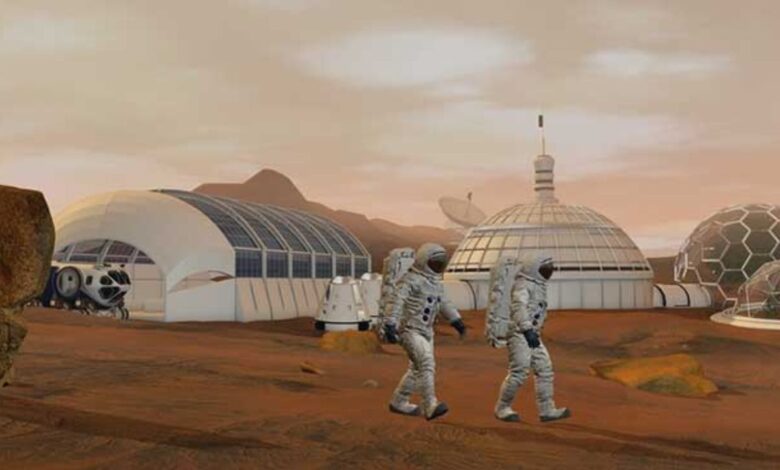
1. introduction:
Human colonization of Mars represents a bold and visionary endeavor in the realm of space exploration. Mars, our neighboring planet, has long fascinated scientists, engineers, and visionaries as a potential destination for human settlement. Organizations like NASA and private companies such as SpaceX have been diligently working on the technologies and strategies required to turn this dream into a reality. The key to creating a colony on Mars over the next 30 years is robotic mining that can offer water and fuel. Humans will inhabit Mars by 2050 if autonomous mining techniques soon increase in commercial viability.

2. Challenges in Colonizing Mars:
1. Harsh environmental condition: Extremely harsh environmental conditions exist on Mars, including icy temperatures, a tenuous atmosphere, significant radiation levels, and dust storms. The main difficulty is to protect people and equipment from these conditions.
2. Life support: Because Mars lacks a habitable atmosphere, colonists must rely on life-support devices to provide them with food, water, and air. It is crucial to create and maintain dependable life support systems that can function in the Martian environment.
3. Radiation Hazards: Mars lacks the protective shield of a magnetic field and thick atmosphere, leaving surface inhabitants exposed to hazardous cosmic and solar radiation. Shielding technologies and protective measures are paramount.
4. Resource Procurement: Sustainability on Mars demands resource utilization, including water extraction from ice and local fuel production. Innovations in resource harvesting technologies are vital.
5. Space Transportation Challenges: Safe transportation to and from Mars necessitates the development of spacecraft capable of enduring lengthy journeys, mitigating radiation risks, and employing reliable propulsion systems.
6. Human Health Implications: Prolonged exposure to microgravity during space travel and reduced Martian gravity pose health risks. Developing medical solutions and countermeasures is imperative.
7. Psychological Well-being: Maintaining the mental and emotional well-being of Mars colonists during extended isolation and confinement is a paramount concern.
8. Sustainability Initiatives: Achieving self-sufficiency by generating power, recycling resources, and efficiently managing waste is essential for long-term success on Mars.
9. Budgetary Considerations: The colossal cost of Mars missions and colonization endeavors necessitates securing funding and exploring cost-effective approaches.

3. Technological Solutions:
Human colonization of Mars is a complex endeavor that requires innovative solutions across various domains. Here are some suitable solutions to address the challenges of settling on Mars:
1. Cutting-Edge Life Support Systems: The key to thriving on Mars is the development of highly efficient life support systems. These systems must be compact, reliable, and tailored to operate seamlessly in the Martian environment.
2. Innovative Radiation Protection: Martian habitats should incorporate innovative radiation shielding techniques, possibly utilizing local resources like Martian regolith or water ice, to safeguard colonists from harmful cosmic and solar radiation.
3. Resource Harvesting Technologies: Pioneering resource extraction technologies will be pivotal. This includes harnessing water ice for hydration, farming, and producing critical resources like oxygen and building materials directly from the Martian terrain.
4. Advanced Spacecraft and Propulsion: The safe transport of humans and cargo to and from Mars necessitates cutting-edge spacecraft and propulsion systems. Streamlining travel times and minimizing radiation exposure are top priorities.
5. Health Solutions for Space Travel: To counteract the adverse health effects of extended space travel and reduced gravity on Mars, continuous research and development of medical solutions are imperative.
6. Psychological Well-being Support: Addressing the psychological challenges of isolation, confinement, and homesickness requires robust support programs and engaging activities for colonists’ mental and emotional well-being.
7. Sustainable Agriculture: The development of sustainable farming and food production systems on Mars, including hydroponics and aquaponics, will enable colonists to cultivate fresh produce locally.
8. Renewable Energy Utilization: Solar and other renewable energy sources should power Martian habitats and equipment, reducing reliance on Earth for energy supply.
9. Efficient Waste Management: Implementing efficient waste recycling and disposal systems minimizes environmental impact while optimizing resource utilization.
10. Robotic Assistance: Advanced robotics and AI systems will play a pivotal role in tasks such as construction, maintenance, and resource extraction, alleviating the workload on human colonists.
11. International Collaboration: Foster global collaboration and partnerships to share expertise, resources, and technologies, fostering a united effort toward Mars colonization.
12. Regulatory and Ethical Guidelines: Establish transparent legal and ethical frameworks to address concerns like property rights, resource allocation, and potential conflicts on Mars.
13. Cost-Effective Innovations: Continuously seek cost-effective approaches and innovative solutions to make Mars colonization financially viable.
14. Comprehensive Training: Thoroughly educate and train astronauts and future colonists in essential skills, including technology operation, emergency procedures, and resource management specific to Martian living.
15. Scientific Exploration: Ongoing scientific research on Mars’ geology, climate, and potential for supporting life informs colony planning and resource utilization.

4. Feasibility of human colonization :
The feasibility of human colonization on Mars is a complex and ongoing topic of study and research. While there are numerous challenges and obstacles to overcome, significant progress has been made, and the feasibility of Mars colonization is being actively explored. Here are some factors that contribute to the feasibility of human colonization on Mars:
1. Cutting-Edge Space Technology: The feasibility of human colonization on Mars has been significantly boosted by breakthroughs in space technology. Notably, the development of spacecraft like SpaceX’s Starship promises efficient and cost-effective travel to the Red Planet.
2. Resource Utilization Innovation: To enhance sustainability, researchers are actively developing technologies for resource extraction on Mars. This includes extracting water ice, a valuable resource for drinking water, plant cultivation, and oxygen production. In-situ resource utilization (ISRU) is pivotal for self-sufficiency.
3. Advanced Life Support Systems: Progress in life support systems is making it increasingly viable to maintain human life in the challenging Martian environment. These systems can effectively recycle air and water while providing a controlled habitation environment and waste management.
4. Radiation Shielding Solutions: Innovative radiation shielding methods and habitat designs are under exploration to protect future colonists from the harsh cosmic and solar radiation on Mars. Utilizing Martian regolith as a shielding material is an intriguing avenue.
5. Collaborative Endeavors: International cooperation among space agencies, private enterprises, and nations is playing a vital role in Mars exploration and colonization efforts. Collaborative initiatives help pool resources and expertise for success.
6. Expanding Scientific Knowledge: Mars missions conducted by NASA and other space agencies continue to deepen our understanding of the planet’s geology, climate, and potential habitability, paving the way for colonization.
7. Investment Drive: Both government space agencies (e.g., NASA, ESA) and private companies (e.g., SpaceX, Blue Origin) are driving forward with Mars colonization, spurring advancements in technologies and strategies.
8. Sustainability Focus: Sustainability is at the core of colonization plans, with an emphasis on reducing reliance on Earth for resupply and developing closed-loop systems for efficient resource recycling.
9. Health and Medical Research: Active research into the physiological and psychological effects of microgravity and Martian gravity is ongoing, aiming to mitigate potential health risks for future colonists.
10. Rigorous Testing and Simulation: Organizations are rigorously testing Mars habitats, technologies, and operational procedures in extreme Earth environments to better prepare for the challenges of colonization.

5. Human colonization impacts on Earth:
Human colonization on Mars, if successful, could have several impacts on Earth. These impacts would result from the technological, scientific, economic, and social developments associated with space exploration and colonization. Here are some potential impacts of human colonization on Earth:
Technological Advancements:
Space Technology: The development of advanced spacecraft, propulsion systems, life support systems, and resource utilization technologies for Mars colonization could lead to innovations with applications on Earth. For example, advancements in propulsion systems could benefit long-distance space travel and potentially revolutionize transportation on Earth.
Scientific Knowledge:
Planetary Science: Mars colonization missions and research would enhance our understanding of planetary science, geology, and climatology, contributing to Earth’s knowledge base in these fields.
Space Medicine: The study of long-term space travel’s effects on human health could have applications for healthcare and medicine on Earth.
Economic Opportunities:
Space Industry: The growth of a space industry related to Mars colonization, including resource extraction, manufacturing, and tourism, could create jobs and stimulate economic growth on Earth.
Space Tourism: A successful Mars colony could boost space tourism, opening up new opportunities for businesses and tourism-related revenue on Earth.
Environmental Awareness:
Planetary Stewardship: The colonization of Mars might heighten awareness of the importance of environmental stewardship on both Mars and Earth, potentially leading to increased efforts to protect our planet’s ecosystems.
Global Collaboration:
International Cooperation: Collaborative efforts in Mars colonization could set a positive example for global cooperation, fostering diplomatic ties and potentially inspiring cooperation on Earthbound challenges.
Inspiration and Education:
STEM Education: The excitement generated by Mars colonization could inspire more students to pursue careers in science, technology, engineering, and mathematics (STEM) fields, potentially addressing the STEM workforce gap on Earth.
Ethical and Legal Considerations:
Resource Allocation: Earth would need to grapple with the ethical and legal challenges of resource allocation, particularly regarding valuable materials extracted from Mars.
Planetary Protection: Establishing strict planetary protection measures to prevent the contamination of Mars with Earth organisms would require new regulations and enforcement mechanisms.
Public Engagement and Space Exploration Advocacy:
Public Interest: Mars colonization could sustain public interest in space exploration and inspire future generations to support space missions and research.
Advocacy for Space Exploration: The success of Mars colonization could lead to increased advocacy for funding space exploration projects, benefiting both Mars missions and Earth-bound scientific endeavors.
Health and Well-being: The focus on the health and well-being of Mars colonists may lead to advancements in healthcare technologies, particularly in areas related to remote healthcare, telemedicine, and life support systems.
Energy and Resource Management: Efforts to develop sustainable practices and technologies for Mars colonization could have spin-off benefits on Earth in terms of renewable energy, resource management, and waste reduction.

6. conclusion:
Summary of Benefits of Human Colonization on Mars:
Scientific Advancements: Mars colonization offers opportunities for cutting-edge research in planetary science, geology, and climatology, enhancing our understanding of planetary processes and Earth’s history.
Technological Innovation: The development of advanced space technologies for Mars missions can lead to technological breakthroughs with applications on Earth, potentially revolutionizing fields like transportation and healthcare.
Economic Opportunities: A thriving space industry related to Mars colonization, including resource extraction and tourism, could stimulate economic growth and create jobs on Earth.
Environmental Awareness: Colonization may increase awareness of planetary stewardship, prompting a renewed focus on environmental protection on Earth.
Global Cooperation: Collaborative efforts in Mars colonization can foster international cooperation, setting a positive example for diplomatic relations and problem-solving on Earth.
Inspiration and Education: The excitement surrounding Mars missions can inspire more students to pursue STEM careers, helping address workforce gaps in these fields.
Ethical and Legal Considerations: Addressing ethical and legal challenges related to resource allocation and planetary protection can lead to the development of new regulations and governance frameworks applicable to Earth’s global challenges.
Summary of Challenges of Human Colonization on Mars:
Harsh Environmental Conditions: Mars’ extreme environment, including a thin atmosphere and radiation exposure, poses significant challenges for human habitation and safety.
Resource Limitations: Mars lacks readily available resources, necessitating the development of efficient resource extraction and utilization technologies to sustain colonists.
Health Risks: Extended space travel and reduced gravity on Mars can have adverse effects on human health, requiring rigorous medical research and countermeasures.
Psychological Stress: The isolation, confinement, and separation from Earth can lead to psychological challenges for colonists, demanding robust support systems.
Financial Costs: Mars colonization is financially demanding, with substantial costs for transportation, infrastructure, and resource development.
Ethical Considerations: Ethical dilemmas related to planetary protection, rights of colonists, and resource allocation require careful consideration and resolution.
Environmental Impact: Colonization efforts may have environmental impacts on Mars, including potential surface alterations and contamination, necessitating responsible resource management.
 For more check our website:najmussaqib.info
For more check our website:najmussaqib.info




I don’t think the title of your article matches the content lol. Just kidding, mainly because I had some doubts after reading the article.
You have a real talent for this field. What Is Cryptocurrency Industry
Your writing has a real personal touch. What Is Cryptocurrency Crypto
Your point of view caught my eye and was very interesting. Thanks. I have a question for you.
Good
I’m always inspired by your words. Indian Football
Get expert assistance for MBBS Admission Through Management/Nri Quota in Karnataka.
Learn about cost-effective learning opportunities at MBBS Fees Structure in Orissa.
Get the latest financial updates at https://look4.in/resources/finance-additional-information.php.
Stay entertained anywhere with the feature-packed Raja Luck App.
Securely log in to 82 Lottery Login and explore a world of amazing games.
Follow the latest EV News to stay updated on electric vehicles and green energy.
I know this if off topic but I’m looking into starting my own blog and was curious what all is needed to get set up? I’m assuming having a blog like yours would cost a pretty penny? I’m not very internet savvy so I’m not 100 certain. Any tips or advice would be greatly appreciated. Many thanks